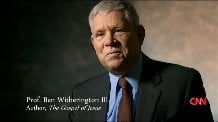The final episode of Finding Jesus focuses on Mary Magdalene and her relationship with Jesus. Of course, ever since the Da Vinci Code there has been no end of speculation about the nature of this relationship. There are of course mysteries along the way as we study Mary’s story. Why exactly does she just disappear from the pages of the NT after Easter morning? One interesting suggestion made in this last episode of Finding Jesus is that she was an older woman, and perhaps she died not many years after Easter, and so played no major role in the rise of early Christianity (contrast this with the later notions in the Gnostic texts that she became a famous teacher or perhaps was intimate with Jesus).
We may be thankful that this episode makes clear that Mary Magdalene was not a prostitute nor was she the woman caught in adultery. The story in Lk. 7.36-50 involves an anonymous woman, as does the story in John 7.53-8.11. Mary Magdalene’s issue was demon possession, as the beginning of this show makes quite apparent. There is also in this episode the interesting suggestion as well that Mary was well-to- do, maybe even was a business woman having a fishing business. This is not impossible, but probably the reference in Lk. 8.3 mentions a woman who more clearly had higher status and access to considerable resources— Joanna the wife of Chuza, Herod’s estate manager.
The show however also regales us with more fanciful tales from the considerably later Gnostic documents such as the Gospel of Mary which present a very different picture, namely of Mary as either: 1) the closest disciple of Jesus whom Jesus loved better than the male disciples; 2) a teacher after Easter, even of the men including Peter; 3) a rival teacher to Peter who in turn takes umbrage at her attempting to teach and lead.
The canonical Gospels in fact suggest none of this, nor is there even a hint of the possibility of Jesus and Mary Magdalene being intimate or even married in these earliest Christian documents. At one juncture in this show a professor from Manchester suggests Jesus might have been like other missionaries who had ‘missionary wives’ who traveled with them. But Jesus so far as we know, never left the Holy Land as a missionary to other regions at all, and anywhere he went in Galilee he could go to and return in a day or so to his base in Capernaum. He in fact counsels his disciples to rely on the system of standing hospitality in the villages they visit, not on the purse strings of the women disciples. The argument that Jesus took Mary Magdalene as a wife is not merely an argument without evidence, it is an argument against the evidence we have for Jesus speaks of being a eunuch for the sake of the kingdom in Mt. 19, and it is difficult not to see this as Jesus providing his disciples with a rationale for why he remained single. It is striking that Paul, our earliest source of information on this matter says in 1 Cor. 9 that he has a right to travel with a a Christian sister as a wife, like Peter and some of the Lord’s brothers. What he does NOT say is ‘like Jesus himself’.
The interesting Gospel of Mary was written in Coptic. It most certainly does not date back to the first century A.D. not least because it reflects the later, and non-Jewish ethos and ideas about the nature of Jesus’ teaching (as Professor Lewis from Brown notes in the show) and again it is written in Coptic. None of the first century Christian documents, including even non-canonical ones like 1 Clement and the Didache are written in Coptic. Christianity developed in Egypt over the course of several centuries, but we have no evidence it was generating competing Gospels in Coptic in the first century A.D. These Gnostic documents reflect later concerns and interests, and sadly also the attempt to sublimate the roles of women in the rise of early Christianity.
Christianity began as a thoroughly Jewish sect, much like other early Jewish sects, and the vast majority of the NT documents were surely written by Jews. They give no hint that earliest Christianity was diverse enough to include groups like those which produced the Gnostic documents. The myth of origins involving wide diversity and even dueling Gospel traditions in the first century, favored by Elaine Pagels and others is just that— a myth. The diversity in Christianity increased the more Gentile the movement became, and these Gnostic documents reflect the later diversity, not to mention various non-Jewish and even anti-Semitic ideas.
This particular show, like the series strives for balance while still presenting us with new information that the average viewer will not have heard of before. David Gibson and Mark Goodacre and Candida Moss are to be commmended for striving to present a spectrum of views about Mary Magdalene and other interesting subjects in this series, and not succumbing to the desire for mere titillation without historical verification. We could use more shows like this that at least raise some of the right questions, without trying to force the issue in regard to more speculative answers to those historical questions.













